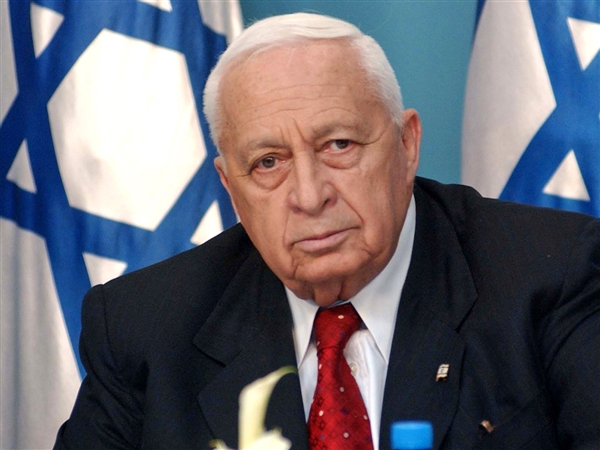IN THE MEDIA
Bulldozer who guided Israel from centre
January 13, 2014 | Ahron Shapiro

Ahron Shapiro
THE AUSTRALIAN – JANUARY 13, 2014
THE passing of Ariel Sharon, Israel’s first truly centrist prime minister, is a watershed event in Israel’s history, as he served in a unique capacity as the pivotal bridge between Israel’s founding generation and political landscape and the mature and modern Israel of today.
As the father of the Likud party, Sharon was often portrayed as the quintessential rightwinger and, by default, a banner-waver of Ze’ev Jabotinsky’s Revisionist Zionist movement. However, a closer look at Sharon, both in the historical record and in his own words, shows this was far from accurate and reveals a far more complex reality.
In the early days of the state, as commander of the elite Unit 101, Sharon worked closely with Labor icons prime minister David Ben-Gurion and Israeli Defence Forces chief-of-staff Moshe Dayan in order to formulate deterrence against terror attacks orchestrated by Palestinian fedayeen raiders largely from Egyptian territory.
His success on the battlefield in the wars of 1956, 67 and 73, and in particular his acumen in planning and executing audacious tank manoeuvres on the battalion level, was Sharon’s claim to fame.
His crossing of the Suez Canal in the late stages of the Yom Kippur War, which ended a stalemate in the Sinai and secured Israel’s victory, made Sharon a household name in the diaspora as much as in Israel.
He leveraged this political capital into his vision of a united party that could challenge Labor’s hegemony as the ruling party in Israel since the founding of the state. That party, the Likud (united), comprised of Menachem Begin’s rightwing Revisionist Herut, the (non-socialist Zionist) Liberal party and other smaller factions, unseated a scandal-ridden Labor party in 1977, in an election that will forever be known as the mahapach (upset).
Under intense pressure to neutralise the Palestine Liberation Organisation’s growing military capability as well as its persistent Katyusha rocket attacks from Lebanon on northern Israel, Sharon presided over the First Lebanon War as defence minister.
This chapter of Sharon’s career will remain controversial, particularly for what the Kahan Commission concluded was Sharon’s personal responsibility “for ignoring the danger of bloodshed and revenge” and “not taking appropriate measures to prevent bloodshed” by Christian Phalangist militiamen at Beirut’s Sabra and Shatila refugee camps in mid-September 1982 in the aftermath of Lebanese president-elect Bachir Gemayel’s assassination.
Yet even the biggest critics of Sharon’s actions in the Lebanon War must concede that the defeat of the PLO’s military arm in Lebanon and the expulsion of the organisation’s leadership to Tunisia all but eliminated the PLO’s military options, laying the foundations for the Oslo Accords the following decade. After his resignation as defence minister, Sharon reinvented himself as a minister of trade and industry and, later, housing and national infrastructure.
It was during this time that he earned the nickname The Bulldozer for his ability to push through projects. It was during this time, too, as housing minister under Yitzhak Shamir, that Sharon stepped up construction of Israel’s settlements in the West Bank and Gaza Strip, galvanising his reputation as a champion of the settler movement.
While there is no question that Sharon harboured a great deal of admiration for settlers, he made it clear in his autobiography, Warrior, that his settlement plans, especially their placement, were always rooted in what he believed was Israel’s security.
This contention was put to the test later when, as prime minister, Sharon reached the conclusion that Israel’s 21 settlements in Gaza (as well as four in the northern West Bank) had become liabilities to Israel’s security and national interests. Unencumbered by Revisionist ideology, pragmatist Sharon in 2005 initiated a policy of unilateral disengagement and withdrawal from these areas – a decision that created a rift in the Likud and led to Sharon’s departure from the party to create the centrist Kadima faction, taking some prominent Laborites like Shimon Peres with him in the process. With Sharon expected to win a clear mandate for Kadima in the 2006 election, his meandering political journey from defence confidante to Labor’s leadership to Likud kingpin to centrist maverick was complete. His massive stroke in January 2006, however, left his mandate unfulfilled, and his successors in the party, Ehud Olmert, Tzipi Livni and Shaul Mofaz failed to maintain his momentum or realise his vision.
As a political nonconformist who stood apart from, and yet was respected by, Laborites and their Revisionist rivals, Sharon was uniquely able to attain political objectives beyond his other political contemporaries, expanding the national consensus on the concept of a two-state peace outcome consistent with Israeli security.
His ability to lead the country despite no allegiance to a particular ideology other than simple Zionism has opened doors to a generation of Israeli leaders unfettered by party doctrine.
The vision of Sharon and his eminently successful centrist Kadima party – the fulfilment of his political ambitions, however ephemeral – has shown that Israel’s natural pull to the centre is a force that must always be reckoned with in Israel elections. For this legacy, even Sharon’s greatest critics must give him his due.
Ahron Shapiro is policy analyst at the Australia/Israel & Jewish Affairs Council.
Tags: Israel





